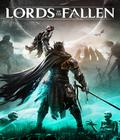Lords of the Fallen is yet another Soulslike that follows the path forged by From Software. It's an overcrowded genre that rarely, if ever, reaches the heights of the original, but there are some notable exceptions, and Lords of the Fallen is one such example. While it never establishes its own distinct visual identity, it serves up solid Soulslike content intertwined with a few genuinely fun and distinct additions that mix up the tried-and-true formula of its genre contemporaries. While it doesn't come anywhere close to the genre staples, it's a welcome breath of fresh air in a niche that's set on imitation rather than evolution.
If you're not overly familiar with Dark Souls, Lords of the Fallen looks like a copycat, with dark environments, foggy bogs, Gothic architecture, traditional RPG class systems and armor builds. It wears its inspiration on its sleeve, with slow and heavy rolls to evade telegraphed attacks and a tight but rewarding block and counter system. If all you've ever wished for was another Dark Souls, Lords of the Fallen scratches that itch visually, if nothing else. It initially seemed a little too similar for me to treat it as anything other than a cash-in clone, but the game quickly convinced me otherwise. The actual heart of the experience is very different from other Soulslike titles.
We start off by selecting a class and then utilize the solid character builder to add a face to our protagonist. Whether you'd prefer to play as a pyromancer or pack a sword and shield, the expected options are available and lend themselves well to specialized builds that make a difference in-game. As you play, you may even unlock additional, more specialized classes. With our class, skill points, and visage all set, the game throws us into the world of Axiom with the simple but daunting objective of preventing the return of a demon god called Adyr.
There is a narrative, and it may be more substantial than similar titles, but it's often told in the usual gibberish of item descriptions and cryptic NPC blabber that From Software established many years ago, with a few dedicated storytelling scenes to keep the plot moving. In other words, it's present if you want to engage with it, but you can also beat up on brutal foes without the story framework. One big advantage of the story is the way it translates into actual gameplay. Within the first tutorial section, we receive a lantern to guide us through the spirit world parallel to Axiom, which is the main thing that sets apart Lords of the Fallen from similar experiences.
Lords of the Fallen essentially takes a page out of The Medium's playbook by layering two versions of the world on top of each other and using them in several interesting ways. While in the world of the living, Axiom, we can use the lamp to peek into the world of the dead, Umbral, and unblock our path. For example, a wall or gate blocking our path in Axiom may not be present in Umbral, so using our lamp can help us skip past obstacles by shining a light ahead of us.
To progress, we sometimes need to go to this alternate reality to physically activate levers or platforms that are only available in the parallel world. That doesn't sound too groundbreaking on its own, but it's smartly interwoven with the experience. While we can always cross from the real world into the world of the dead, we cannot easily cross back unless we find a specific resting point. Given that this parallel world contains many more enemies — and the longer you're present, the more foes will spawn — taking too long to traverse the dead alternative landscape can quickly become dangerous and overwhelming. At the same time, this second world is also your failsafe. Not too dissimilar to Sekiro, dying in Lords of the Fallen is not necessarily the end. Dying in the real world simply transfers you to the world of the dead, which offers you a second chance in a much more dangerous environment.
How that changes things might be a bit abstract, but in the end, it adds more variety to the Soulslike experience by adding an action-adventure element, some basic puzzle-solving, and additional considerations when engaging and traversing the world. It tickles the risk/reward area of the brain in all the right ways, even if the actual combat portions feel eerily familiar.
The combat system in Lords of the Fallen felt more floaty than in Dark Souls, and the lock-on system caused issues in keeping the focus on certain enemies. The game enjoys throwing entire swarms of enemies at you, so the lock-on system resulted in a few unfair deaths. I'm sure this will eventually get improved with updates, and developer Hexworks has provided regular updates since the game's release. On the flip side, I enjoyed the speed at which the protagonist moves and fights. Initially, that has little bearing on the feel of combat, but as enemies get more elaborate and your weapons grow stronger, combat can pick up a level, and the approach falls into the sweet spot between Sekiro exchanging blows at a frantic speed and the more methodical Dark Souls combat.
The dual-world system intrigued me the most about Lords of the Fallen and kept me going even when things got frustrating — and they do get frustrating quite regularly. The biggest gripe I had wasn't the difficult boss fights but the amount of backtracking that's required every time you die. Often, going through a string of minibosses on your way to the next checkpoint, dying at any point sends you back and often respawns the minibosses. I've spent a disproportionate amount of time progressing through a tough patch of minibosses. Bosses felt like nice little spectacles and offered some challenging fights, and if I could've avoided some of the repeated backtracking, I would've appreciated the game and those fights a lot more.
Lords of the Fallen also implements a checkpoint system that is worth mentioning. While there are fixed checkpoints, there are also areas where special seeds can be sown to create your own checkpoints. It's an interesting idea that doesn't feel fully fleshed out. It often adds another resource to track, and since only one seed can be active at a time, it didn't feel like it added much to the experience. I could see a more custom checkpoint system in games like these being a great idea, but this implementation wasn't quite it. It didn't prevent a lot of the backtracking that I had mentioned.
As a sum of its parts, Lords of the Fallen is a very solid Soulslike that attempts to be creative. Not everything ultimately works to its benefit, but it elevates the experience above many similar offerings. If you're a fan of Soulslike games, this title is likely one you'd want to try for its intriguing ideas. At this stage, the only reason not to try the title would likely be how well it runs.
We tested Lords of the Fallen on the PC with a 3080, and we had the occasional performance dips and some inconsistent frame rates. Again, things have improved over the last few weeks due to regular patches getting rolled out. If you're rocking weaker hardware, it may be worth waiting a bit to ensure performance is up to snuff. Visually, Lords of the Fallen shows why Unreal Engine 5 is a big deal. I still think the game doesn't do nearly enough to visually distinguish itself from the likes of Dark Souls, the amount of fidelity is quite staggering. There's a lot of eye candy between the little details in surfaces, the instantaneous switch between both worlds, and the detailed character models.
I've played my fair share of Soulslike titles, and Lords of the Fallen is currently far ahead of the pack. It provides the standard gameplay anyone would expect from this kind of game and adds enough interesting gameplay mechanics to be distinct and worthwhile. Sure, there are some frustrating design decisions, and it struggles to establish its own visual identity, but it innovates, and it looks good while doing so. If you're interested in these types of games, Lords of the Fallen is certainly the best of its kind that I've played this year.
Score: 7.8/10
More articles about Lords Of The Fallen











 Lords Of The Fallen is an action RPG set within a medieval fantasy world ruled by a Fallen God where you will fight against the formidable Lords and Generals that command his demonic army.
Lords Of The Fallen is an action RPG set within a medieval fantasy world ruled by a Fallen God where you will fight against the formidable Lords and Generals that command his demonic army.



























